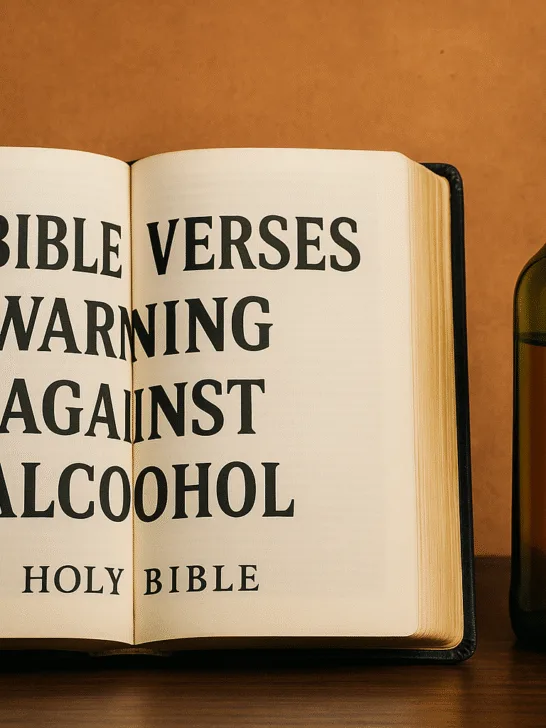The Bible addresses alcohol consumption with nuance, acknowledging its place in cultural and religious life while warning strongly against excess. For Christians seeking to honor God and care for their bodies and communities, understanding “bible verses against alcohol” is essential. This article examines key passages from both Old and New Testaments, explores their historical and theological context, and offers practical insights for today’s believer.
Historical and Cultural Context
In the ancient Near East wine and strong drink were common at festivals and daily meals. Yet Israel’s law and prophetic literature often highlight the dangers of overindulgence. Under the Mosaic covenant, regulations sought to balance cultural norms with God’s call to holiness. Prophets used vivid language to denounce those who prioritized intoxication over justice and mercy. Recognizing this backdrop helps modern readers see that Scripture addresses not wine itself but the heart and behavior of those who drink (Walton, 2006).
Proverbs’ Warnings Against Drunkenness
The book of Proverbs repeatedly cautions that wine can deceive and strong drink can lead to conflict. In Proverbs 20:1 readers learn that wine is a mocker and beer a brawler, and whoever is led astray is not wise (New International Version, 2011, Prov. 20:1). Further on, Solomon compares excessive drinking to chasing after death and ruin (New International Version, 2011, Prov. 23:29–35). These passages emphasize that loss of self‑control clouds judgment and invites personal and social harm.
Prophetic Denunciations of Excess
Prophets such as Isaiah and Habakkuk decry those who rise early to pursue strong drink. Isaiah portrays revelers whose feasting ends in shame and spiritual blindness (New International Version, 2011, Isa. 5:11–12). Habakkuk pronounces woe on those who give alcohol to neighbors so they may revel and to women so they may be drunk (New International Version, 2011, Hab. 2:15). The prophetic voice frames drunkenness as a moral and communal offense, connected with injustice and the neglect of covenant duties.
New Testament Admonitions
Under the new covenant, the apostle Paul and other writers continue the theme of moderation and self‑discipline. Paul lists drunkenness among the works of the flesh that are contrary to inheriting God’s kingdom (New International Version, 2011, Gal. 5:19–21). In Ephesians he contrasts being drunk with wine, which leads to debauchery, with being filled by the Spirit (New International Version, 2011, Eph. 5:18). Peter urges believers to be sober and vigilant because spiritual adversaries seek to devour them as lions (New International Version, 2011, 1 Pet. 5:8). These passages link sobriety with readiness for ministry and resistance to temptation.
Wine in Ministry and Medicine
While many verses warn against drunkenness, Scripture does permit moderate wine for celebration and health. Jesus’ first recorded miracle turned water into wine at a wedding in Cana, illustrating divine blessing on joyful gatherings (New International Version, 2011, John 2:1–11). Paul advises Timothy to take a little wine for his stomach ailments (New International Version, 2011, 1 Tim. 5:23). These examples show that alcohol itself is not inherently sinful. Rather sin arises when it dominates one’s will or harms others.
Theology of the Body and Christian Witness
The New Testament teaches that the body is God’s temple and believers should honor Him with their bodies (New International Version, 2011, 1 Cor. 6:19–20). Excessive drinking undermines physical health and mental clarity. Moreover, Christians are called to avoid actions that cause weaker believers to stumble (New International Version, 2011, Rom. 14:13–21). Choosing sobriety when alcohol may lead others into temptation or misunderstanding becomes an act of love and stewardship.
Practical Applications for Today
In contemporary culture where social drinking is commonplace, believers must exercise discernment. Small groups and accountability partnerships can provide support for those struggling with alcohol. Churches may offer counseling or Celebrate Recovery–style ministries that address substance abuse. Individuals can adopt practices such as designated sober days or fasting from alcohol during seasons of spiritual focus. The goal is not legalism but freedom in Christ and health for body, mind, and community.
10 Bible Verses Against Alcohol
1. Proverbs 20:1
Wine is a mocker and beer a brawler; whoever is led astray by them is not wise. This verse personifies alcohol as a deceiver that undermines judgment. By avoiding intoxication, believers guard their wisdom and reputation (New International Version, 2011, Prov. 20:1).
2. Proverbs 23:29–30
Who has woe? Who has sorrow? Who has strife? Who has complaints? Who has needless bruises? Who has bloodshot eyes? Those who linger over wine. Solomon uses vivid imagery to expose the physical and emotional toll of lingering at the wine cup. The rhetorical questions warn that excess leads to regret and suffering (New International Version, 2011, Prov. 23:29–30).
3. Isaiah 5:11
Woe to those who rise early in the morning to run after their drinks, who stay up late at night till they are inflamed with wine. Isaiah pronounces judgment on those who prioritize intoxication over justice and devotion. The “woe” signals God’s displeasure with a lifestyle centered on strong drink (New International Version, 2011, Isa. 5:11).
4. Habakkuk 2:15
Woe to him who gives drink to his neighbors, pouring it from the wineskin till they are drunk, so that he can gaze on their naked bodies. The prophet condemns those who facilitate others’ shame through alcohol. This verse links moral corruption to the misuse of intoxicants (New International Version, 2011, Hab. 2:15).
5. Ephesians 5:18
Do not get drunk on wine, which leads to debauchery. Instead, be filled with the Spirit. Paul contrasts two forms of “being filled”—with wine or with the Spirit. Drunkenness results in moral looseness, whereas Spirit‑filling produces self‑control and godly character (New International Version, 2011, Eph. 5:18).
6. Galatians 5:19–21
The acts of the flesh include drunkenness and orgies. I warn you, as I did before, that those who live like this will not inherit the kingdom of God. In listing drunkenness among the works of the flesh, Paul underscores its incompatibility with Christian life. Habitual excess threatens one’s relationship with God and community (New International Version, 2011, Gal. 5:19–21).
7. 1 Peter 5:8
Be sober-minded; be watchful. Your adversary the devil prowls around like a roaring lion seeking someone to devour. Peter links sobriety with spiritual vigilance. Drunkenness dulls awareness and leaves believers vulnerable to temptation and spiritual attack (New International Version, 2011, 1 Pet. 5:8).
8. Proverbs 31:4–5
It is not for kings, Lemuel, to drink wine, nor for rulers to crave beer, lest they drink and forget what the law decrees. The virtuous woman’s son warns leaders against alcohol’s impairing effects. Rulers must maintain clarity of mind to administer justice and uphold the law (New International Version, 2011, Prov. 31:4–5).
9. Romans 14:21
It is better not to eat meat or drink wine or to do anything that causes your brother to stumble. Paul appeals to love and consideration for weaker believers. Even permissible actions, like drinking wine, become unwise if they harm someone’s faith (New International Version, 2011, Rom. 14:21).
10. Joel 1:5
Wake up, you drunkards, and weep; wail, all you drinkers of wine, because of the new wine, for it has been snatched from your lips. Joel uses lament to depict sudden loss of what was once celebrated. The removal of wine becomes a symbol of divine judgment and the folly of placing hope in earthly pleasures (New International Version, 2011, Joel 1:5).
Conclusion
Bible verses against alcohol consistently warn against losing self‑control, moral compromise, and harm to community. At the same time Scripture affirms moderate, mindful use of wine for celebration and healing. Christians uphold the biblical call to moderation, wisdom, and love for neighbors by making informed choices about alcohol. In doing so they honor God’s design for the body and bear witness to the transforming power of the Holy Spirit.
References
New International Version Bible. (2011). Zondervan.
Walton, J. H. (2006). Ancient Near Eastern thought and the Old Testament: Introducing the conceptual world of the Hebrew Bible. Baker Academic.
You Might Also Like
The Power of Binding and Loosing in Prayer
https://biblewealthguide.com/the-power-of-binding-and-loosing-in-prayer/
Fight Spiritual Battles According to the Bible
https://biblewealthguide.com/fight-spiritual-battles-according-to-bible/
Breaking Strongholds: Overcome Oppression
https://biblewealthguide.com/breaking-strongholds-overcome-oppression/
How to Cultivate Spiritual Discernment
https://biblewealthguide.com/how-to-cultivate-spiritual-discernment/
How to Walk in Divine Favor
https://biblewealthguide.com/how-to-walk-in-divine-favor/

